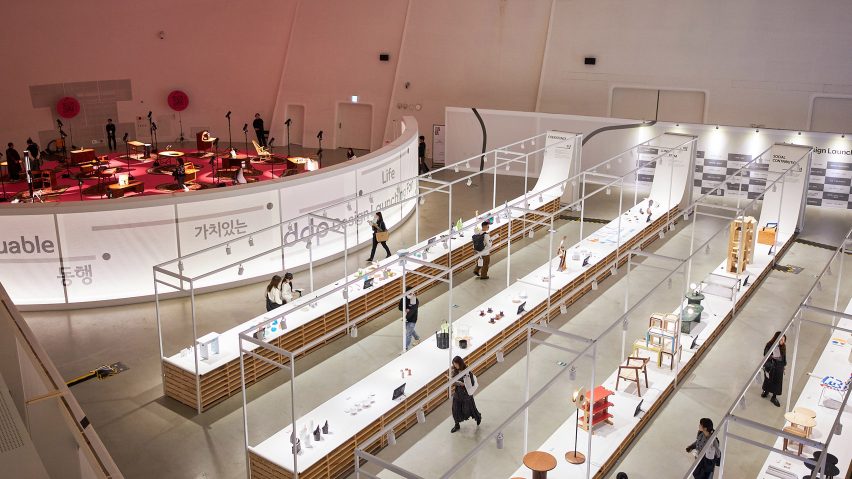A modular shelter made from cardboard, a street bench made of recycled plastics and oyster shells and an inkless pencil are among the highlights of this year's Seoul Design.
For its 10th anniversary, Seoul Design 2023 looked at what role design should play in creating a sustainable future under the theme of Valuable Life.
The annual event, which is hosted by the Seoul metropolitan government and organised by Seoul Design Foundation, combines the Seoul Design Week festival and tradeshow Design Launching Fair.
This year, it focused on elevating Korean design brands to the global stage and had a strong environmental and sustainable angle.
"We want to open up our design industry to more businesses and distributors internationally, to make Korean design truly global, " Seoul Design Foundation's CEO Rhee Kyung-Don told Dezeen.
Read on for a roundup of five of projects that showcase Seoul Design 2023's sustainable approach:
Disaster Temporary Housing Module by Shigeru Ban
Japanese architect Shigeru Ban has designed a version of his temporary shelters – which can be used to house people affected by war and environmental disasters – especially for Korea.
The prototype is a simple structure that uses cardboard tubes as columns. Honeycomb cardboard made from hanji, a Korean traditional paper, form the shelter's modular wall panels, while cardboard tubes function as its roof structure.
The foundation was composed of makgeolli (Korean rice wine) crates, instead of steel or concrete, to minimise the environmental impact and keep costs low. By adding modular wall units and columns, the size of the shelter can be extended when necessary.
The shelter can be built without the help of skilled builders, since all the materials are lightweight, and was designed to be easy to assemble and disassemble for relocation.
Taesan Bench by Lowlit Collective
Taesan Bench is a street-furniture range sourced and manufactured from Tikkle plastics. Made from discarded plastic, the bench was enhanced using biomaterials such as oyster shells and natural fibres.
Developed by Seoul-based design studio Lowlit Collective, the bench is the first piece in a wider collection and takes its inspiration both from Korea's mountainous terrain and the practice of traditional sumukhwa – ink-wash painting. The recycled plastic was ground by hand, resulting in unique patterns and colours.
Zai pencils by One+Design/MW
Seoul-based design studio One+Design/MW has presented two types of pencils under the brand Zai that it claims will last a long time without sharpening.
According to the studio, the carbon-ink pencils never require any sharpening and would never break. It says this is because their ink core has been compressed 100 times more than a normal pencil.
The studio also showed an inkless silverpoint pencil, composed of metal alloy and silver, that it claims will last forever. The company aims to cut the cost and environmental impact of conventional wooden pencils.
Hairbrushes by University of Seoul Industrial Design Department students and LABO-H
A team of four senior students from the University of Seoul Industrial Design Department has created eight different hairbrushes for a more fun and accessible hair-washing experience.
The students collaborated with shampoo brand LABO-H to explore how design can shape people's basic daily behaviours and contribute to a positive social impact. Materials used in the brushes include silicon and plastics recycled from coconut shells.
Among the designs were a triangle-shaped hand-held brush suitable for washing a fringe of hair, and a set of three finger caps with different cap shapes to give a more intense hair-massage experience.
LABO-H held an online vote for the public to choose their favourite brush design and will manufacture the most popular one.
Zero Waste Pavillion curated by Yoo Ehwa
Zero Waste Pavillion was a public resting area located at the central square of Dongdaemun Design Plaza (DDP). Curated by architect Yoo Ehwa from ITM Architecture Office in Seoul, the pavilion was built entirely with paper and coconut chips from handmade floorboard specialist Kujung Maru.
The paper rolls from paper company Hansol Paper were adapted into stools and presentation boards. All materials used in the pavilion will be recycled and reused after the exhibition.
Seoul Design 2023 took place from 24 October to 2 November 2023. See Dezeen Events Guide for an up-to-date list of architecture and design events taking place around the world.

